Fleurs du Mal Magazine


Or see the index
With her first full-length poetry collection, Warsan Shire introduces us to a young girl, who, in the absence of a nurturing guide, makes her own way toward womanhood.
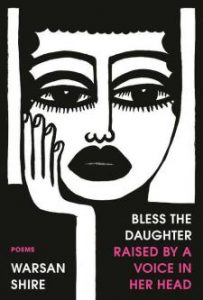 Drawing from her own life, as well as pop culture and news headlines, Shire finds vivid, unique details in the experiences of refugees and immigrants, mothers and daughters, Black women and teenage girls. In Shire’s hands, lives spring into fullness. This is noisy life, full of music and weeping and surahs and sirens and birds. This is fragrant life, full of blood and perfume and shisha smoke and jasmine and incense.
Drawing from her own life, as well as pop culture and news headlines, Shire finds vivid, unique details in the experiences of refugees and immigrants, mothers and daughters, Black women and teenage girls. In Shire’s hands, lives spring into fullness. This is noisy life, full of music and weeping and surahs and sirens and birds. This is fragrant life, full of blood and perfume and shisha smoke and jasmine and incense.
This is polychrome life, full of henna and moonlight and lipstick and turmeric and kohl. The long-awaited collection from one of our most exciting contemporary poets, this book is a blessing, an incantatory celebration of resilience and survival. Each reader will come away changed.
Warsan Shire is a Somali British writer and poet born in Nairobi and raised in London. She has written two chapbooks, Teaching My Mother How to Give Birth and Her Blue Body. She was awarded the inaugural Brunel International African Poetry Prize and served as the first Young Poet Laureate of London. She is the youngest member of the Royal Society of Literature and is included in the Penguin Modern Poets series. Shire wrote the poetry for the Peabody Award–winning visual album Lemonade and the Disney film Black Is King in collaboration with Beyoncé Knowles-Carter. She also wrote the short film Brave Girl Rising, highlighting the voices and faces of Somali girls in Africa’s largest refugee camp. Warsan Shire lives in Los Angeles with her husband and two children. Bless the Daughter Raised by a Voice in Her Head is her full-length debut poetry collection.
Bless the Daughter Raised by a Voice in Her Head
Poems
By Warsan Shire
Category: Poetry
Publisher : Random House Trade Paperbacks
(March 1, 2022)
Language: English
Paperback
96 pages
ISBN-10: 0593134354
ISBN-13: 978-0593134351
$17.00
• fleursdumal.nl magazine
More in: #Modern Poetry Archive, - Book News, Archive S-T, Archive S-T
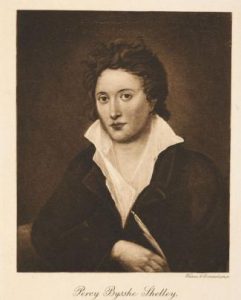
The Indian Serenade
I arise from dreams of thee
In the first sweet sleep of night,
When the winds are breathing low,
And the stars are shining bright:
I arise from dreams of thee,
And a spirit in my feet
Hath led me—who knows how?
To thy chamber window, Sweet!
The wandering airs they faint
On the dark, the silent stream—
The Champak odours fail
Like sweet thoughts in a dream;
The Nightingale’s complaint,
It dies upon her heart;—
As I must on thine,
Oh, belovèd as thou art!
Oh lift me from the grass!
I die! I faint! I fail!
Let thy love in kisses rain
On my lips and eyelids pale.
My cheek is cold and white, alas!
My heart beats loud and fast;—
Oh! press it to thine own again,
Where it will break at last.
Percy Bysshe Shelley
(1792 – 1822)
The Indian Serenade
• fleursdumal.nl magazine
More in: Archive S-T, Archive S-T, Percy Byssche Shelley
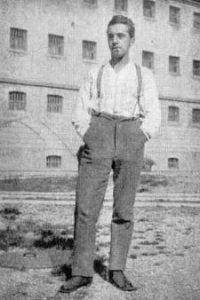
Den Toten der Revolution
Todgeweihte Leiber
trotzig gestemmt
Wider den Bund
der rohen Bedränger,
Löschte Euch Schicksal
mit dunkler Gebärde.
Wer die Pfade bereitet,
stirbt an der Schwelle,
Doch es neigt sich vor ihm
in Ehrfurcht der Tod.
Ernst Toller
(1893 – 1939)
Den Toten der Revolution
• fleursdumal.nl magazine
More in: Archive S-T, Archive S-T, Toller, Ernst
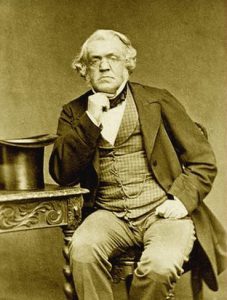
Sorrows of Werther
WERTHER had a love for Charlotte
Such as words could never utter;
Would you know how first he met her?
She was cutting bread and butter.
Charlotte was a married lady,
And a moral man was Werther,
And for all the wealth of Indies
Would do nothing for to hurt her.
So he sigh’d and pin’d and ogled,
And his passion boil’d and bubbled,
Till he blew his silly brains out,
And no more was by it troubled.
Charlotte, having seen his body
Borne before her on a shutter,
Like a well-conducted person,
Went on cutting bread and butter.
William Makepeace Thackeray
(1811–63)
Sorrows of Werther
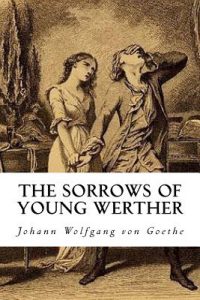
• fleursdumal.nl magazine
More in: # Classic Poetry Archive, -Die Leiden des jungen Werther, Archive S-T, Archive S-T
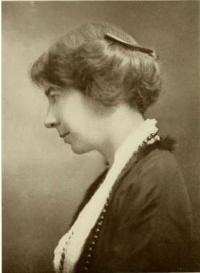
Day And Night
In Warsaw in Poland
Half the world away,
The one I love best of all
Thought of me to-day;
I know, for I went
Winged as a bird,
In the wide flowing wind
His own voice I heard;
His arms were round me
In a ferny place,
I looked in the pool
And there was his face
But now it is night
And the cold stars say:
“Warsaw in Poland
Is half the world away.”
Sara Teasdale
(1884-1933)
Day And Night
• fleursdumal.nl magazine
More in: Archive S-T, Archive S-T, Teasdale, Sara

Come away, come away,
death
Come away, come away, death,
And in sad cypress let me be laid.
Fly away, fly away, breath;
I am slain by a fair cruel maid.
My shroud of white, stuck all with yew,
O, prepare it!
My part of death, no one so true
Did share it.
Not a flower, not a flower sweet,
On my black coffin let there be strown.
Not a friend, not a friend greet
My poor corpse, where my bones shall be thrown.
A thousand thousand sighs to save,
Lay me, O, where
Sad true lover never find my grave,
To weep there!
William Shakespeare
(1564 – 1616)
Song: “Come away, come away, death”
(from Twelfth Night)
• fleursdumal.nl magazine
More in: Archive S-T, Archive S-T, Shakespeare, William
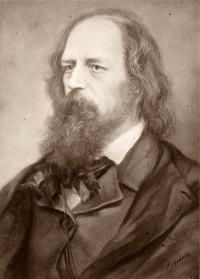
Maud
Come into the garden, Maud,
For the black bat, Night, has flown,
Come into the garden, Maud,
I am here at the gate alone;
And the woodbine spices are wafted abroad,
And the musk of the roses blown.
For a breeze of morning moves,
And the planet of Love is on high,
Beginning to faint in the light that she loves
On a bed of daffodil sky,
To faint in the light of the sun she loves,
To faint in his light, and to die.
All night have the roses heard
The flute, violin, bassoon;
All night has the casement jessamine stirr’d
To the dancers dancing in tune;
Till a silence fell with the waking bird,
And a hush with the setting moon.
I said to the lily, ‘There is but one
With whom she has heart to be gay.
When will the dancers leave her alone?
She is weary of dance and play.’
Now half to the setting moon are gone,
And half to the rising day;
Low on the sand and loud on the stone
The last wheel echoes away.
I said to the rose, ‘The brief night goes
In babble and revel and wine.
O young lord-lover, what sighs are those
For one that will never be thine?
But mine, but mine,’ so I sware to the rose,
‘For ever and ever, mine.’
And the soul of the rose went into my blood,
As the music clash’d in the hall;
And long by the garden lake I stood,
For I heard your rivulet fall
From the lake to the meadow and on to the wood,
Our wood, that is dearer than all;
From the meadow your walks have left so sweet
That whenever a March-wind sighs
He sets the jewel-print of your feet
In violets blue as your eyes,
To the woody hollows in which we meet
And the valleys of Paradise.
The slender acacia would not shake
One long milk-bloom on the tree;
The white lake-blossom fell into the lake,
As the pimpernel dozed on the lea;
But the rose was awake all night for your sake,
Knowing your promise to me;
The lilies and roses were all awake,
They sigh’d for the dawn and thee.
Queen rose of the rosebud garden of girls,
Come hither, the dances are done,
In gloss of satin and glimmer of pearls,
Queen lily and rose in one;
Shine out, little head, sunning over with curls.
To the flowers, and be their sun.
There has fallen a splendid tear
From the passion-flower at the gate.
She is coming, my dove, my dear;
She is coming, my life, my fate;
The red rose cries, ‘She is near, she is near;’
And the white rose weeps, ‘She is late;’
The larkspur listens, ‘I hear, I hear;’
And the lily whispers, ‘I wait.’
She is coming, my own, my sweet;
Were it ever so airy a tread,
My heart would hear her and beat,
Were it earth in an earthy bed;
My dust would hear her and beat,
Had I lain for a century dead;
Would start and tremble under her feet,
And blossom in purple and red.
Alfred Lord Tennyson
(1809 – 1892)
Maud
Published in 1855.
• fleursdumal.nl magazine
More in: Archive S-T, Archive S-T, Tennyson, Alfred Lord
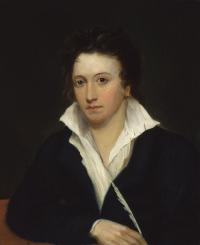
Love’s Philosophy
The fountains mingle with the river
And the rivers with the Ocean,
The winds of Heaven mix for ever
With a sweet emotion;
Nothing in the world is single;
All things by a law divine
in one spirit meet and mingle.
Why not I with thine?-
See the mountains kiss high Heaven
And the waves clasp one another;
No sister-flower would be forgiven
If it disdained its brother;
And the sunlight clasps the earth
And the moonbeams kiss the sea:
What is all this sweet work worth
If thou kiss not me?
Percy Bysshe Shelley
(1792 – 1822)
Love’s Philosophy
• fleursdumal.nl magazine
More in: Archive S-T, Archive S-T, Shelley, Percy Byssche

Nacht
Zinnoberroter Traum emporreißt unterdrückte Lust,
Die wandgeketteten verdammten Pritschen stöhnen,
O, nun auftauchen Bilder, die den kahlen Raum verschönen,
Der Dämon wühlt in unsrer Brust.
Erwachend höhnen, Kupplerinnen, uns die Eisengitter,
Im Morgengrauen sind die Zellen wie verweinte Mütter.
Ernst Toller
(1893 – 1939)
Nacht
• fleursdumal.nl magazine
More in: Archive S-T, Archive S-T, Toller, Ernst

Being your slave,
what should I do but tend
Being your slave, what should I do but tend
Upon the hours and times of your desire?
I have no precious time at all to spend,
Nor services to do, till you require.
Nor dare I chide the world-without-end hour
Whilst I, my sovereign, watch the clock for you.
Nor think the bitterness of absence sour
When you have bid your servant once adieu;
Nor dare I question with my jealous thought
Where you may be, or your affairs suppose,
But like a sad slave, stay and think of nought,
Save, where you are how happy you make those.
So true a fool is love that in your will
Though you do anything, he thinks no ill.
William Shakespeare
(1564 – 1616)
Being your slave, what should I do but tend
Sonnet 57
• fleursdumal.nl magazine
More in: Archive S-T, Archive S-T, Shakespeare, William

Begegnung in der Zelle
Die Dinge, die erst feindlich zu dir schauen,
Als wären sie in Späherdienst gezwängte Schergen,
Sie laden dich zu Fahrten ein gleich guten Fergen,
Und hegen dich wie schwesterliche Frauen.
Es nähern sich dir all die kargen Dinge:
Die schmale Pritsche kommt, die blauen Wasserkrüge,
Der Schemel flüstert, daß er gern dich trüge,
Die Wintermücken wiegen sich wie kleine Schmetterlinge.
Und auch das Gitterfenster kommt, das du verloren,
Mit Augen, die sich an den schwarzen Stäben stachen,
Anstarrtest, während deine Arme hilflos brachen,
Und Köpfe der Erschoßnen wuchsen aus versperrten Toren.
Das Gitterfenster ruft: Nun, Lieber, schaue, schaue,
Wie ich aus Wolken dir ein Paradies erbaue.
Ernst Toller
(1893 – 1939)
Begegnung in der Zelle
• fleursdumal.nl magazine
More in: Archive S-T, Archive S-T, Toller, Ernst

Doubt
My soul lives in my body’s house,
And you have both the house and her,
But sometimes she is less your own
Than a wild, gay adventurer;
A restless and an eager wraith,
How can I tell what she will do,
Oh, I am sure of my body’s faith,
But what if my soul broke faith with you?
Sara Teasdale
(1884-1933)
Doubt
• fleursdumal.nl magazine
More in: Archive S-T, Archive S-T, Teasdale, Sara
Thank you for reading Fleurs du Mal - magazine for art & literature